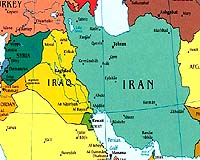 |
Baghdad (UPI) Feb 18, 2009 Oil Minister Hussein al-Shahristani assured foreign companies contracted to develop Iraq's major oilfields and restore its economy that security is not a problem any more. But amid a continuing insurgency, demands by tribal chiefs for a cut of the oil revenues, which Saddam Hussein provided in his day to buy loyalty, and labor unions' struggle to keep out foreign workers the oil companies want to bring in, Baghdad's plan to quadruple oil production is anything but risk-free. Shahristani wants to boost Iraq's production level, currently around 2.4 million barrels a day, to 10 million-12 million in six years to rival Saudi Arabia, the world's leading producer. Days before the oil ministry auctioned off 20-year production contracts for Iraq's biggest fields to foreign oil companies, insurgents carried out a wave of suicide bombings in Baghdad that killed more than 120 people. "The terrorists tried to send a message to the oil companies through the bombings," Shahristani said on national television. "But this message was not delivered." That may be so. The biggest oil field auction in history was a smash hit as far as the Iraqi government was concerned, even if some U.S. giants were not willing to take the risk or to meet the oil ministry's conditions. But as parliamentary elections scheduled for March 7 approach, al-Qaida and other militants are keeping up their attacks. They are clearly determined to ignite the kind of ferocious sectarian bloodletting that occurred a couple of years ago. On Feb. 10, Shahristani said the security situation in Iraq was not the problem but the possibility of war in other parts of the region was. That may be the case now but with U.S. military forces withdrawing under a security agreement with Prime Minister Nouri al-Maliki's government, that may not always be so. U.S.-troop strength is less than 100,000 for the first time since the March 2003 invasion that toppled Saddam's regime. Troop strength peaked in 2007 during the so-called surge offensive that badly mauled the insurgents but did not eliminate them. Al-Qaida and its suicide bombers remain a potent threat and are still capable of carrying out coordinated bombings even within the heavily guarded center of Baghdad. According to U.S. military officials, Iran is becoming increasingly active in supporting militants and destabilizing the country. They say the Tehran regime wants to consolidate its influence, and even control, once the U.S. withdrawal is completed. In December, Iranian forces seized an oil well in a disputed field on the border, restating Tehran's myriad claims. They eventually withdrew but the message was clear: Iran was prepared to use force to back up its claims. The Iraqi government does not have the forces or the firepower to go up against the Iranians, who fund and arm Shiite militants who can be mobilized against the government any time Tehran says so. The continued failure of the Iraqi parliament to approve an oil law that regulates the industry and defines revenue-sharing between competing sects and regions also contributes insecurity in the oil fields where the foreign companies are setting up. All U.S. combat forces are scheduled to have gone by August. A 50,000-strong training and advisory contingent will remain but is due to be gone by late 2011. Given the government's reliance on the oil industry to provide revenues for reconstruction, the oil fields, refineries and pipelines are key targets for anyone seeking to sabotage those plans. In 2003-05, there were 200 attacks on oil and gas pipelines. By 2007, there had been more than 600, with exports reduced to a trickle. These could resume and not just by insurgents. One problem is the Saddam-era tradition of letting local tribes siphon off oil from pipelines running through the lands. According to Michael Schwartz, a sociology professor at Stony Brook State University in New York who has written extensively on Iraq's oil and politics, the post-invasion U.S. administration in Baghdad stopped that practice. The result was the near-permanent closure of the pipeline because of attacks. It was reopened in late 2009 after Maliki allowed the tribes to resume their siphoning. Even so, Schwartz notes, the "fragility of the pipeline's service, even today, is one small sign of ongoing resistance that could be an obstacle to any significant increase in oil production until the U.S. military presence is ended."
Share This Article With Planet Earth
Related Links Powering The World in the 21st Century at Energy-Daily.com
 Iran seen as tightening grip on Iraq
Iran seen as tightening grip on IraqBaghdad (UPI) Feb 17, 2009 Allegations by the top U.S. general in Iraq that two politicians who organized the blacklisting of 350 candidates for March 7 elections are linked to Iran's Revolutionary Guards has heightened concern that Tehran is tightening its grip as U.S. forces withdraw. The growing Iranian interference in Iraq at such a critical time is also part of a much wider confrontation over Iran's controve ... read more |
|
| The content herein, unless otherwise known to be public domain, are Copyright 1995-2010 - SpaceDaily. AFP and UPI Wire Stories are copyright Agence France-Presse and United Press International. ESA Portal Reports are copyright European Space Agency. All NASA sourced material is public domain. Additional copyrights may apply in whole or part to other bona fide parties. Advertising does not imply endorsement,agreement or approval of any opinions, statements or information provided by SpaceDaily on any Web page published or hosted by SpaceDaily. Privacy Statement |